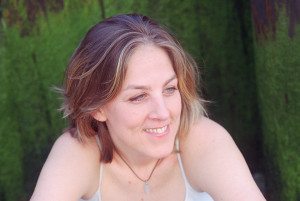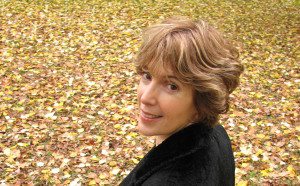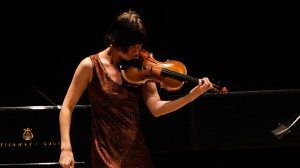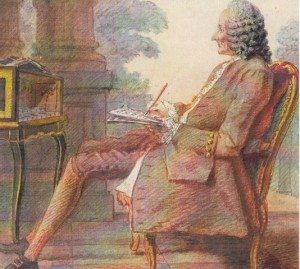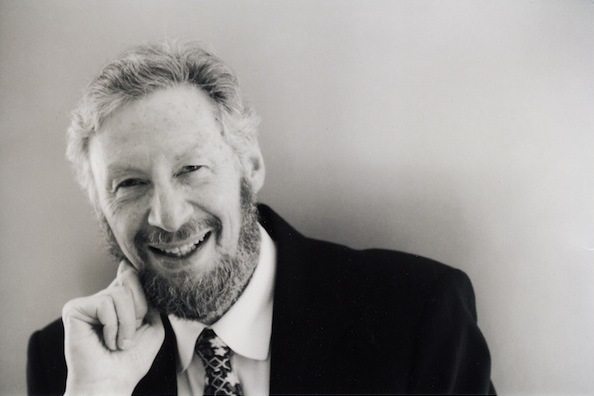World Premiere of New Chamber Work Scheduled for Sept. 26
Also: Open Rehearsal, Friday, Sept. 25, 9 to noon, Mills Hall.
Encore Performance Sunday, Sept. 27, Chazen Museum, 12:30 p.m.
When Beat Generation poet Allen Ginsberg published “Howl” in 1956, he may have anticipated the obscenity charges he faced because of the work’s highly charged content. Chances are he didn’t foresee his epic poem, now considered a significant work of American literature, as the source of inspiration for a 21st Century chamber music composition.
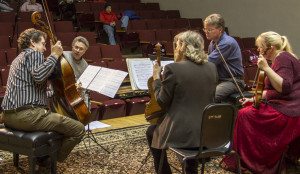
The Pro Arte Quartet during a rehearsal last spring with Belgian composer Benoit Mernier
Pierre Jalbert, an American composer of French-Canadian decent, thought otherwise. When commissioned by the University of Wisconsin Pro Arte Quartet to compose an original work to help the quartet celebrate its centennial season, Jalbert chose Ginsberg’s poem as his source of inspiration. Jalbert’s “Howl” for clarinet and string quartet will receive its world premiere by the Pro Arte on Friday, Sept. 26, at the Wisconsin Union Theater on the UW-Madison campus. The event, free and open to the public, will be the first classical music concert to take place in the historic theater’s newly refurbished Shannon Hall.
The 8 p.m. concert will be preceded by a 7 p.m. concert preview discussion with Jalbert in Shannon Hall. In addition to Jalbert’s composition, the evening’s program includes the String Quartet No. 2 in A Major (1824) by Juan Crisóstomo Arriga and the Clarinet Quintet in A Major (1791) by Wolfgang Amadeus Mozart.
The concert will be repeated Sunday, Sept. 28, at 12:30 p.m. in Gallery III at the Chazen Museum of Art, also on the UW-Madison campus. Joining the Pro Arte for both concerts will be clarinetist Charles Neidich, a regular member of the Orpheus Chamber Orchestra and noted guest performer with orchestras and string quartets worldwide.
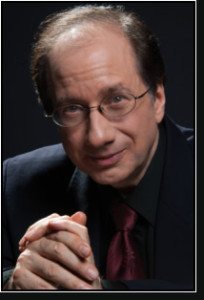
Clarinetist Charles Neidich
“The Jalbert quintet is a very exciting composition, often very rhythmic, but with very serenely quiet contrasting sections,” said Neidich. “It is also interesting in that the clarinetist has to switch to bass clarinet, creating a very different sound for the group.”
Ginsberg, who died in 1997, began work on “Howl” as early as 1954. The poem was first published in “Howl and Other Poems” in 1956 as part of the “Pocket Poets” series by fellow beat poet Lawrence Ferlinghetti, also known as founder of City Lights Books in San Francisco.
Upon the poem’s release, both Ferlinghetti and City Lights manager Shigeyoshi Murao were arrested and charged with distributing obscene material because of the poem’s profanity, drug references and frank sexual content. Four months later, Judge Clayton Horn ruled that the work was not obscene and charges against Ferlinghetti and his employee were dropped.
Judge Horn deemed “Howl” to have redeeming social content, and over the years it’s proved its worth, both in terms of social and literary value, according to Dr. Lynn Keller, the Martha Meier Renk Bascom Professor of Poetry in the UW-Madison Department of English.
” ‘Howl’ stands out stylistically in its compellingly and varied repetition of words beginning successive lines, its near surrealist imagery, and its combination of agonized depictions at once hellish and lofty with a very appealing sense of humor,” Dr. Keller said. “In terms of content, it also stands out in celebrating the down-and-out hipster as spiritual quester and visionary.”
As part of the Beat Generation – as much a social as a literary phenomenon – Ginsberg’s celebration of physical pleasures and suspicions about “the military industrial complex” created a new path that still appeals to younger audiences. “It is a powerful poem, a howl from the heart of an agonized generation in a repressive era,” Dr. Keller said. Jalbert was familiar with the poem prior to the Pro Arte commission, but it was only after he started composing the work that he began to realize the influence Ginsberg had on the music. Those similarities had less to do with the poem’s content and more to do with its structure and rhythm, the composer said.
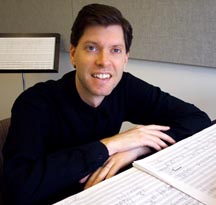
Composer Pierre Jalbert
“At the beginning of my piece, the clarinet is basically playing long tones, creating a long line much like the long lines in Ginsberg’s poem, while the strings present the rhythmically pulsating harmonic underpinning,” Jalbert said. “Ginsberg’s poem has been called a ‘litany of praise,’ and the second movement of my work becomes a litany, much like a series of prayers in a liturgy, with the strings creating chant-like lines while the clarinet becomes the vox Dei, or “voice of God,” hovering mysteriously over everything. The third movement returns to the musical materials from the first movement, but now the bass clarinet takes on the virtuosic role.”
In keeping with emotional soundings in parts of “Howl,” Jalbert also has attempted to capture the “shrieks” that were characteristic to the poem alongside the aforementioned litany of praise.
“There are buildups to shrieking moments in my piece as well as a “howl” motive of a low chord slurred up to an immediate high cluster, all played very forcefully,” said Jalbert. “There’s also something very urban about parts of the poem and to me, there’s an urban quality in my first and third movements. There are also many religious allusions and the last words of Christ on the cross, so the second movement uses some of this.”
The Jalbert composition is the final of six commissions for the Pro Arte Centennial seasons, and it has all the earmarks of a contemporary works with staying power, according to Neidich.
“Having studied the score, I believe that it will be accessible to listeners and exciting to hear,” said Neidich. “It features the clarinet both in the role of soloist and as contributor to the sonority of the ensemble. It has all the necessary attributes to become a significant work.”
The Jalbert commission also brings to an end the Pro Arte’s seasons of centennial celebration in honor of the quartet’s long and storied history. The Quatuor Pro Arte of Brussels, first formed in 1911-1912, was performing at the Wisconsin Union Theatre on the UW-Madison campus on May 10, 1940, when Belgium was overrun and occupied by Nazi forces, turning three of its original four musicians into war orphans. By October of that year, the group had officially become the UW Pro Arte Quartet, making it the first artist ensemble-in-residence at any university in the world. At more than 100 years old, Pro Arte also is thought to be the world’s oldest continuously performing string quartet.
In May, the Pro Arte returned to Belgium to perform the European premiere of its fifth centennial commissioned work, Belgian composer Benoît Mernier’s String Quartet No. 3. The work had received its world premiere on March 1 Mills Concert Hall in the Mosse Humanities Building on the UW-Madison campus with the composer in attendance. Read about their Belgium adventures in a local blog, The Well-Tempered Ear.
The Pro Arte Quartet includes violinists David Perry and Suzanne Beia, violist Sally Chisholm and cellist Parry Karp.
Contacts:
Sarah Schaffer 608/217-6786
Mike Muckian 608/287-6261

